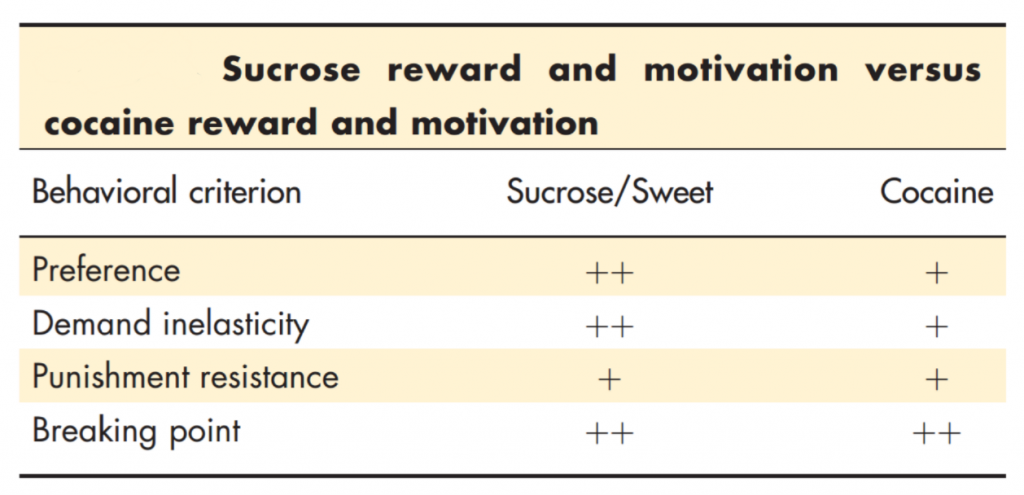 Addictions is defined as a phenomenon that required four components. Bingeing, withdrawal, craving and cross sensitization must be present in varying degrees, and these behavioural characteristics have been linked to physical changes in the neurological circuitry of the brain and central nervous system. Such neurological changes include changes to dopamine and opioid receptor binding, enkephalin mRNA expression, as well as dopamine and acetylcholine release in the nucleus accumbens. Addiction is most commonly applied to recreational drugs, such as cocaine and heroine, but prescription pharmaceuticals can also be addictive. More recently the term ‘food addiction’ has become generally recognised after a series of lines of evidence suggest that certain foods can act in a drug-like manner and cause the same neurological changes as seen from certain addictive drugs. Evidence for example, shows that under certain circumstances, rodents can become sugar (sucrose) dependent, although evidence for humans is more limited.
Addictions is defined as a phenomenon that required four components. Bingeing, withdrawal, craving and cross sensitization must be present in varying degrees, and these behavioural characteristics have been linked to physical changes in the neurological circuitry of the brain and central nervous system. Such neurological changes include changes to dopamine and opioid receptor binding, enkephalin mRNA expression, as well as dopamine and acetylcholine release in the nucleus accumbens. Addiction is most commonly applied to recreational drugs, such as cocaine and heroine, but prescription pharmaceuticals can also be addictive. More recently the term ‘food addiction’ has become generally recognised after a series of lines of evidence suggest that certain foods can act in a drug-like manner and cause the same neurological changes as seen from certain addictive drugs. Evidence for example, shows that under certain circumstances, rodents can become sugar (sucrose) dependent, although evidence for humans is more limited.

Comparisons of cocaine and sucrose have been performed in animal experiments. These experiments show that animals show a ‘preference’ for sucrose over cocaine. Animals also show greater ‘demand elasticity’ to sucrose compared to cocaine, which refers to how far they are prepared to push behavioural costs in order to obtain the substance. Animals are prepared to accept similar level of ‘punishment feedback’ in terms of how much electrical shocking they will accept in order to obtain cocaine or sucrose. A similar ‘breaking point’ is also evidence between sucrose and cocaine, and this is a reflection of how far the animal are prepared to push themselves physically to obtain the substance. These comparisons show that in animals models of addiction, sucrose could be argued to be as addictive as cocaine.
Current evidence in humans may be more limited when compared to animals models, but some studies have investigated sugar addiction in humans. Sugar has for example, been shown to be able to induce cravings in humans that are comparable in magnitude to the cravings induced by addictive drugs. In certain circumstances, sugar has been shown to be more rewarding to animals than cocaine, but for ethical reasons this is not easy to demonstrate in humans. If extrapolation from animal models is performed, it appear that for some individuals, sugar may be even more rewarding than cocaine. If these findings are shown to be repeatable and robust, which at present it appears they are, it would create a possible link between sugar addiction and obesity. Of course it would also be of interest to assess if the reasons that individuals use sugar as a substance of abuse are the same as the reasons that individuals use an addictive drug as a substance of abuse. Stress could very well play a role in this regard, as stress is linked to both addiction and obesity.
Eat Well, Stay Healthy, Protect Yourself
RdB
